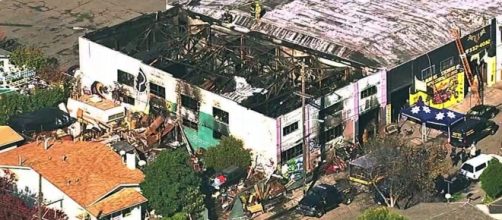It took about four hours, but the city of Oakland, Calif., has rescinded a new policy mandating that police report illegal living spaces in the aftermath of the Dec. 2 warehouse fire that killed 36.
The city imposed the requirement on its officers after newly released documents showed that police, fire and other Oakland officials knew for years that the warehouse known as the Ghost Ship artists' collective was being used by artists for live/work residences.
The Ghost Ship warehouse at 1315 31st Ave., in the city's Fruitvale district, was destroyed by the Dec.
2 fire, which began during a music performance and dance party on the building's second floor. The building, in a gritty commercial area of the Bay Area's third-largest city, did not have permits for residences or large gatherings, according to the San Francisco Chronicle newspaper.
Commercial zoning
But the building likely would not have qualified for such permits anyway because the warehouse was zoned for commercial use, did not have marked emergency exits or a sprinkler system, and had only two ways of accessing the second floor, one of which being stacked-up wooden pallets.
Nearly all of the 36 people killed were apparently overcome by smoke that likely billowed up from the first floor and surprised party attendees.
The makeshift staircase collapsed and partygoers probably were unable to see the remaining stairway at the far end of the building, especially after the lights went out.
Documents released
Authorities in Oakland had avoided releasing official documents for weeks after the fire, but released hundreds of pages in redacted and then unredacted form following a lawsuit filed by area newspapers.
The documents detail dozens of city inspections and visits to the warehouse by police and fire officials between 2004 and 2016 but no enforcement actions taken, the newspaper said.
Ghost Ship was reportedly one of dozens of similar illegal live/work spaces in Oakland. The new policy mandating official reports of unpermitted parties and illegally converted warehouses potentially hazardous situations was announced Thursday but rescinded several hours later, after Oakland's city administrator, Sabrina Landreth, issued a statement that the policy had been released prematurely.
New policy being drafted
But city officials are still believed to be drafting such a policy, the newspaper said, which would bring Oakland in line with other large Bay Area cities that already have such requirements. A spokeswoman for Oakland Mayor LIbby Schaaf said last week that police officers were "not trained to be building inspectors."
But Oakland City Councilman Noel Gallo praised efforts to impose the new policy and questioned why it was pulled back on Thursday. “I don’t know why the city administrator would challenge or question or take back that memorandum," Gallo told the newspaper. "When I see a crime, if I don’t report it, I’m just as guilty as the guy committing the crime," he said.
Former San Francisco Police Chief Tony Ribera told the newspaper that officers should be mandated to report dangerous conditions even when such reports impact other community concerns as, like in this case, a lack of affordable housing.
But Schaaf told the newspaper that requiring officers to report illegal living situations could discourage people from calling 911 in dangerous situations. Jonah Strauss of the Oakland Warehouse Coalition said the now-withdrawn directive was "a license for persecution" of artists and others seeking less expensive living situations.

